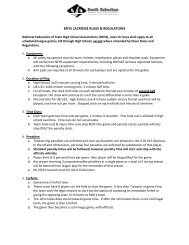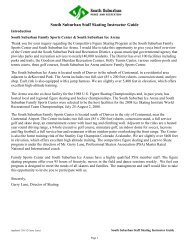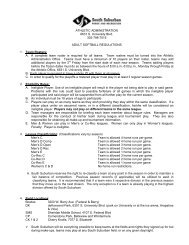2012 Budget - South Suburban Parks and Recreation
2012 Budget - South Suburban Parks and Recreation
2012 Budget - South Suburban Parks and Recreation
You also want an ePaper? Increase the reach of your titles
YUMPU automatically turns print PDFs into web optimized ePapers that Google loves.
<strong>South</strong> <strong>Suburban</strong> Park <strong>and</strong> <strong>Recreation</strong> District<br />
Summary of Significant Financial Policies<br />
Pooled Cash <strong>and</strong> Investments<br />
The District follows the practice of pooling cash <strong>and</strong> investments of all funds to maximize<br />
investment earnings. Except when required by trust or other agreements, all cash is<br />
deposited to <strong>and</strong> disbursed from a single bank account. Cash in excess of immediate<br />
operating requirements is pooled for deposit <strong>and</strong> investment flexibility. Net investment<br />
income is allocated periodically to the participating funds based upon each fund’s average<br />
equity balance in total cash.<br />
Investment Policy<br />
The investment policy of the District is to minimize credit <strong>and</strong> market risks while<br />
maintaining a competitive yield on its portfolio. Accordingly, all deposits are either insured<br />
by federal depository insurance or collateralized. Allowable investments include U.S.<br />
Government Securities <strong>and</strong> Agencies, Repurchase Agreements, Commercial Paper, Money<br />
Market Funds, Time Certificates of Deposit, <strong>and</strong> Local Government Investment Pools. The<br />
maturities of the investments generally range from 30 days to one year, with the average<br />
maturity being six months. Investments must have a maturity date that is less than three<br />
years.<br />
Capitalization Policy<br />
The following is the approved capitalization policy of the <strong>South</strong> <strong>Suburban</strong> Park <strong>and</strong><br />
<strong>Recreation</strong> District:<br />
The following definitions of capital expenditures are provided to ensure uniform<br />
reporting by all departments.<br />
Capital Expenditures - A capital expenditure is any physical resource that benefits a<br />
department for more than three years <strong>and</strong> has a unit cost in excess of $5,000 for<br />
equipment <strong>and</strong> $50,000 for improvements. Capital expenditures include funds<br />
expended for l<strong>and</strong>, water rights, building <strong>and</strong> improvements, improvements other than<br />
buildings, <strong>and</strong> equipment.<br />
L<strong>and</strong> - L<strong>and</strong> includes the direct cost of acquisition, legal fees, site preparation costs<br />
<strong>and</strong> the cost of demolishing unwanted structures on the l<strong>and</strong>. Costs incurred to obtain<br />
easements are considered services <strong>and</strong> other changes.<br />
Water Rights - Water rights includes the direct cost of acquisition, legal <strong>and</strong><br />
engineering fees related to the development <strong>and</strong> augmentation of water rights. All<br />
other costs, including legal <strong>and</strong> engineering fees incurred for the protection of water<br />
rights are considered services <strong>and</strong> other charges.<br />
58









